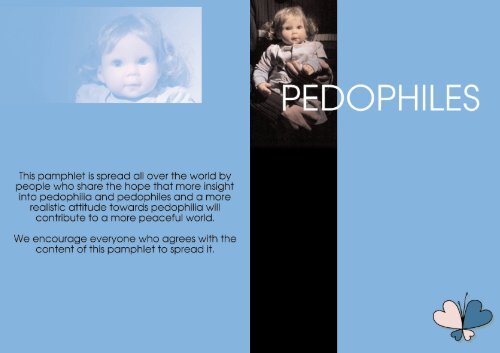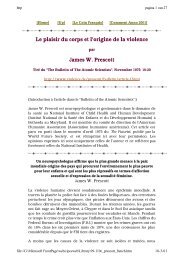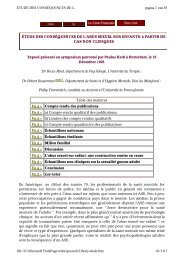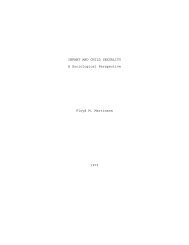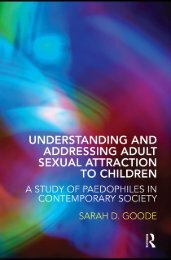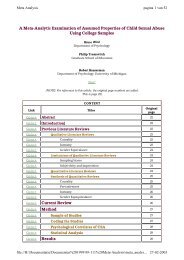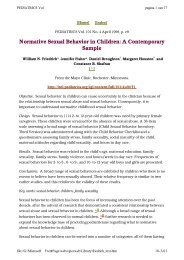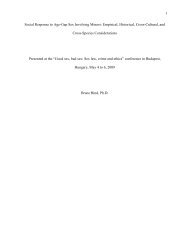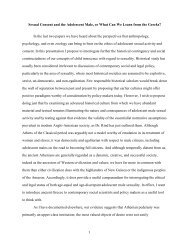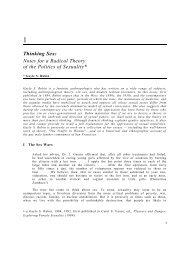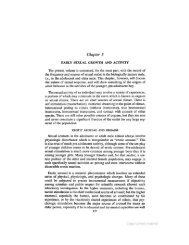Untitled - Ipce
Untitled - Ipce
Untitled - Ipce
You also want an ePaper? Increase the reach of your titles
YUMPU automatically turns print PDFs into web optimized ePapers that Google loves.
Colophon<br />
CLogo Pamphlet<br />
Copyright © CLogo team<br />
Permission is granted to copy, distribute and/or modify this<br />
pamphlet under the terms of the GNU Free Documentation<br />
License.<br />
This pamphlet is provided free of charge by the CLogo team.<br />
The CLogo team also provides free stickers and free buttons of<br />
the ‘butterfly hearts logo’, which is depicted on the front cover<br />
of this pamphlet.<br />
Under no circumstances shall the authors or copyright holder be liable for any<br />
incidental, special, indirect or consequential damage and/or harm arising from<br />
the use, reproduction, modification, distribution and/or publication of this<br />
pamphlet, or any portion thereof, whether under a theory of contract, warranty,<br />
tort (including negligence), strict liability or otherwise, even if the<br />
authors have or copyright holder has been advised of the possibility of such<br />
damage and/or harm and notwithstanding the failure of essential purpose of<br />
any remedy.<br />
(this page intentionally left blank)<br />
Pedophiles I Page 17
9 - Bibliography<br />
Archives of Sexual Behavior, December 2002, special issue about pedophilia<br />
Bauserman, R. & Rind, B., Psychological Correlates of Male Child and<br />
Adolescent Sexual Experiences with Adults: A Review of the Nonclinical<br />
Literature, Archives of Sexual Behavior, vol. 26, no. 2, 1997<br />
Bernard, F., Paedophilia: A Factual Report, Enclave, Rotterdam, 1985<br />
Howitt, D., Paedophiles and sexual offences against children, John Wiley &<br />
Sons, Wiley, Chichester, 1995<br />
Kirkegaard, H. & Northey, W., The Sex Offender as Scapegoat: Vigilante<br />
Violence and a Faith Community Response<br />
Prescott, J. W., Body pleasure and the origins of violence, The Bulletin of The<br />
Atomic Scientists, November 1975, pp. 10-20<br />
Randall, J. L., Childhood and Sexuality: A Radical Christian Approach,<br />
Pittsburgh: Dorrance, 1991<br />
Rind, B. & Tromovitch, P., A Meta-Analytic Review of Findings from National<br />
Samples on Psychological Correlates of Child Sexual Abuse, The Journal of Sex<br />
Research, vol. 34, no.3, 1997, pp. 237-255<br />
Rind, B., Bauserman, R. & Tromovitch, Ph., An Examination of Assumed<br />
Properties of Child Sexual Abuse Based on Nonclinical Samples, Paper presented<br />
to the symposium sponsored by the Pauluskerk, Rotterdam, The<br />
Netherlands, on the 18th of December 1998<br />
Table of Contents<br />
1 - Preface 2<br />
2 - Pedophilia 3<br />
3 - Two Kinds of Pedophiles 4<br />
3.1 - Self-Oriented Pedophiles 4<br />
3.2 - Child-Oriented Pedophiles 5<br />
4 - Questions 6<br />
4.1 - Can I Recognize Pedophiles? 6<br />
4.2 - Can Pedophiles Be Cured? 6<br />
4.3 - What Attracts Pedophiles to Children? 7<br />
4.4 - How Many Pedophiles Are There? 7<br />
5 - Myths 8<br />
5.1 - Myth: Children Don’t Like Sex 8<br />
5.2 - Myth: Children Will Become Homosexual 8<br />
5.3 - Myth: Pedophiles Always Misuse Their Power 9<br />
5.4 - Myth: Sexual Experiences Always Cause Harm 9<br />
6 - Message to Parents 10<br />
7 - Research 11<br />
7.1 - Difficulties Obtaining Data 11<br />
7.2 - Negative Experiences 12<br />
7.3 - Pedophiles’ Characteristics 13<br />
8 - Message to Pedophiles 14<br />
8.1 - Four Main Guidelines 15<br />
8.2 - Openness Towards the Parents 15<br />
9 - Bibliography 16<br />
Rind, B., Tromovitch, Ph. & Bauserman, R., A Meta-Analytic Examination of<br />
Assumed Properties of Child Sexual Abuse Using College Samples,<br />
Psychological Bulletin 1998, vol. 124, no. 1, pp. 22-53<br />
Tromovitch, Ph., Rind, B. & Bauserman, R., Adult Correlates of Child Sexual<br />
Abuse: A meta-analytic review of college student and national probability<br />
samples, SSSS-ER April 18, 1997<br />
Wilson, G. D. & Cox, D. N., The Child-Lovers, A Study of Paedophiles in Society,<br />
Pedophiles I Page 16
1 - Preface<br />
Deprivation of sensory stimuli like voice and vision in the early<br />
phases of human life are known to cause irreversible mental<br />
retardation in the child. Also the restriction of child play will<br />
cause intellectual deficits in the adult.<br />
However, eyes, ears and the nose are not the only human sensors.<br />
Additionally, there are the two body sensor systems, the<br />
‘somatosensors’. One is the balance organ for maintaining<br />
orientation and upright walk. The other one is the skin, for<br />
sensing touch.<br />
Through the work of James W. Prescott, Ph.D. and various<br />
others until the mid 1970s it was established that these previously<br />
neglected senses are of overwhelming importance for<br />
the development of social abilities. Their deprivation in childhood<br />
is a major cause for adult violence. Various scientists have<br />
documented the importance of touch, movement, affection<br />
and sexual freedom for the development of children and juveniles<br />
into healthy and peaceful adults. Deprivation of physical<br />
affection is considered a main cause of depression, aggression<br />
and drug abuse.<br />
Fear of pedophilia and pedophiles unfortunately causes most<br />
people to deny the importance of affectionate relationships in<br />
youth for peaceful and loving behavior. Partly, this fear is valid,<br />
but it is inappropriate to consider anything sexual or any physical<br />
affection by ‘strangers’ a risk to children.<br />
This pamphlet is spread all over the world by people who share<br />
the hope that more insight into pedophilia and pedophiles<br />
and a more realistic attitude towards pedophilia will contribute<br />
to a more peaceful world. We encourage everyone who<br />
agrees with the content of this pamphlet to spread it.<br />
8.1 - Four Main Guidelines<br />
Right now, all laws regarding sex in child-adult relationships<br />
focus on an age of consent, which differs per country and may<br />
be different for homosexuals and heterosexuals. However,<br />
more and more researchers tend to agree that the right to selfdetermination<br />
should be the essential starting point for new<br />
sex crime laws.<br />
These laws would not only make it easier to protect children<br />
from the violence and obsessive lust of self-oriented pedophiles.<br />
They would also give children and child-oriented pedophiles<br />
the freedom to explore their sexuality in healthy relationships,<br />
as long as these are in accordance with four main guidelines,<br />
or conditions.<br />
1. consent of both child and adult,<br />
2. freedom for the child to withdraw from the relationship<br />
at any moment,<br />
3. harmony with the child’s level of psycho-sexual<br />
and physical development,<br />
4. openness towards the parents of the child<br />
8.2 - Openness Towards the Parents<br />
In most societies, pedophilia is an emotionally charged concept.<br />
Because of the many prejudices, pedophiles will be afraid<br />
to be open about a (sexual) relationship towards the child’s<br />
parents. Nonetheless, openness is a crucial condition. Children<br />
should always be protected from self-oriented pedophiles. A<br />
child’s parents should be able to determine to what extent the<br />
three other guidelines are being respected. Your feelings are<br />
private, but your actions are not. The parents of the child have<br />
the right to know what you are up to with their child... and<br />
what their child is up to with you.<br />
Pedophiles I Page 2 Pedophiles I Page 15
8 - Message to Pedophiles<br />
2 - Pedophilia<br />
Little is known to be as difficult as not being able to prove your<br />
love. How to deal with these unusual feelings for children? As<br />
you already may have found out, there is no simple answer to<br />
this question.<br />
Some pedophiles buy dolls that are very lifelike, some choose a<br />
variety of occupations that allow them to care for children and<br />
some look for adult partners who are very youthful in their looks<br />
and manners. For sexual gratification, many pedophiles restrict<br />
themselves to masturbation, for which they may use fantasies<br />
and stories of a pedophilic nature.<br />
There is one great mistake you can make. You may think you created<br />
your feelings and desires in the first place and you may<br />
want to overcome them by trying to avoid any contact with children.<br />
But by repressing your feelings, you will never learn to<br />
integrate these feelings for children. This will make you a potential<br />
danger to others, including children and yourself, because all<br />
that remains is an obsessive lust for children, which could cause<br />
you to lose self-control.<br />
The first step in the right direction is the opposite: to accept your<br />
feelings for children as a part of yourself and to deal with them<br />
the best you can. Recreational activities and friendship with children<br />
are very well possible. Meeting children who share your<br />
hobby (in sports, music, arts, collecting things) at a club or collectors’<br />
market may be a good solution for you. This contact is<br />
quite natural, because the central focus is on the activity and not<br />
on the child.<br />
Talking about your feelings with peers might be a good idea. If<br />
you decide to look for help from a psychiatrist or sexologist, only<br />
accept it from those who agree it’s better to accept than to<br />
repress your feelings.<br />
Through the years, a social process has shifted the meaning of<br />
the word pedophilia. While it used to denote loving children,<br />
today it implies at least an aspect of sexuality. Today, pedophilia<br />
can best be defined as feeling mainly attracted, including<br />
sexually, to prepubescent children of either or both sexes. Note<br />
that this attraction (or preference) does not imply an action. It<br />
is certainly not an extreme urge against which resistance is<br />
impossible. The term pedophilia may include erotic, aesthetic,<br />
emotional and spiritual aspects. However, it remains a onesided<br />
concept, since it only refers to the adult.<br />
Most pedophiles are oriented toward either boys or girls, while<br />
bisexual pedophiles seem to represent a minority among them.<br />
Most prefer a certain age group.<br />
Some pedophiles feel different from other adults, because<br />
they treat children more as peers. They believe some adults<br />
regard children as inferior and do not listen carefully enough<br />
to them: to educate children, such adults frequently force<br />
them to do things with little regard for the child’s feelings and<br />
opinions. Pedophiles who have this concern would like to<br />
grant children the right to make up their own minds, including<br />
in the area of sexuality.<br />
Most pedophiles who have become aware of their unusual feelings<br />
for children are initially confused about what is happening<br />
to them. Are they about to become as evil as these pedophile<br />
rapists they hear about in the media? Their struggle<br />
might end if they realize that not all pedophiles are monsters<br />
and there are two kinds of pedophiles.<br />
Pedophiles I Page 14 Pedophiles I Page 3
3 - Two Kinds of Pedophiles<br />
Even though all pedophiles are different, it is possible to make<br />
a broad distinction between two kinds of pedophiles:<br />
• self-oriented pedophiles, who are either aggressive-sadistical<br />
or see children as their only way to sexual satisfaction,<br />
• child-oriented pedophiles, for whom the feelings of the child<br />
are of essential importance<br />
3.1 - Self-Oriented Pedophiles<br />
Self-oriented pedophiles are either aggressive-sadistical or see<br />
children as their only way to sexual satisfaction. Most have not<br />
tried to face and accept their unusual feelings for children.<br />
Because of fear, they have repressed these feelings. This makes<br />
them a potential danger to others, including children and<br />
themselves. They have not learned to cope with their feelings<br />
for children; what remains is an obsessive lust for children<br />
which may result in compulsive acts, without self-control.<br />
In a contact between a child and a self-oriented pedophile,<br />
there may be violence, the threat of violence, deception, emotional<br />
blackmail, assault and rape. This type of pedophile is<br />
merely focused on sexual gratification.<br />
In these contacts, the lust of the adult is the only measure<br />
applied for basing action upon. The child is seen as a passive<br />
partner and an (occasional) sex object. It is usually impossible<br />
for the child to withdraw from sexual activities if the child<br />
wants to. Self-oriented pedophiles exploit feelings of shame<br />
on the part of the child and use these to enforce secrecy. In the<br />
oppressive atmosphere, the child will experience no safety, but<br />
instead will feel only fear and aversion.<br />
7.3 - Pedophiles’ Characteristics<br />
Despite the difficulties, there does exist research involving<br />
pedophiles who were in a relationship with a child (current or<br />
not current at the time of research) and who were not in legal<br />
trouble or in any sort of treatment. A remaining limitation is<br />
of course that only people who are aware of their pedophilic<br />
feelings and openly admit them - at least to researchers - can<br />
be interviewed.<br />
A variety of personality tests performed by child-oriented pedophiles<br />
show little differences with the general population.<br />
This applies to both neurological and psychological research.<br />
As far as these differences are significant, they are only small<br />
and may not be pathological, rather variants within the normal<br />
range.<br />
Some differences have been found. The pedophile appears to<br />
be a somewhat shy person who was somewhat lonely in her or<br />
his childhood. Contrary to what most people seem to think,<br />
many pedophiles do not have an extreme urge for sex, their<br />
urge is comparatively small. They are not inclined to competing<br />
with other men and women and show little aggression.<br />
Rather, they are strikingly sensitive.<br />
A somewhat higher degree of psychological complaints and<br />
stress should be seen as a result of their feelings for children<br />
and the animosity of society at large, not as causing their feelings.<br />
Pedophiles I Page 4 Pedophiles I Page 13
cannot be reached by researchers. Despite the imbalance, ‘clinical<br />
and forensic’ research has become the standard by which<br />
theories about pedophilia are measured and by which profiles<br />
are drawn up about pedophilia and ‘the pedophile’ in general.<br />
It is such research that is used for theory framing, classroom<br />
instruction, police instruction, treatment strategies, and policymaking.<br />
Public opinion is reinforced by this kind of research.<br />
Reality can only be disclosed by researching the general population<br />
and not only those people who have problems.<br />
7.2 - Negative Experiences<br />
Estimates of the percentage of people who are permanently<br />
harmed by sexual experience as a child vary widely. Research<br />
which does not in advance define every sexual experience of<br />
children as ‘abuse’ and which asks people how they actually<br />
experienced the sexual events is the most interesting. It turns<br />
out that there are two main factors that cause people to view<br />
the sexual event as negative:<br />
• coercion plays an important role: the more coercion, the<br />
more risk of harm; the less coercion, the less risk of harm.<br />
It turns out that coercion invokes more harm than the actual<br />
sexual event itself,<br />
• family environment plays another important role: its effect<br />
on a persons later well-being is much higher than the effect<br />
of sexual experiences. Maltreatment, neglect, poverty and so<br />
on heavily influence the child’s general feeling of well-being<br />
If these factors are taken into account, the correlation between<br />
effect size of early sexual experiences and later problems<br />
nearly disappears for boys and remains for one percent of girls<br />
with such experiences.<br />
3.2 - Child-Oriented Pedophiles<br />
For child-oriented pedophiles, the feelings of the child are of<br />
essential importance. They have an inner balance, because<br />
they have learned to accept or are willing to accept their feelings<br />
for children as a part of themselves. Thus they will be able<br />
to integrate these emotions and cope with them in a better<br />
way.<br />
A relationship between a child and a child-oriented pedophile<br />
is not only focused on erotic/sexual contacts. The adult has a<br />
sincere interest in the feelings, thoughts and experiences of<br />
the child and wants the relationship to be a valuable supplement<br />
to the child’s life. In these relationships, the adult expresses<br />
an interest in the child’s world. There is common ground,<br />
even if the contact is only a single event. Spontaneity and<br />
friendship may be enjoyed together.<br />
Even though most child-oriented pedophiles have sexual fantasies<br />
about children, their actions are not primarily sexually<br />
driven and they condemn all forms of non-voluntary sexual<br />
contact. To indicate this more clearly, some child-oriented pedophiles<br />
call themselves “child lovers”, “boy lovers” or “girl<br />
lovers”.<br />
As the child grows older, the desire of both the child and the<br />
adult for an intimate friendship (or at least for the sexual component)<br />
usually decreases gradually. The teen may fall in love<br />
with a peer and may become less attractive to the adult. The<br />
teen is usually not discarded carelessly. Physical intimacy - if<br />
there was any - may no longer be part of the relationship, but<br />
there may remain a long-lasting friendship.<br />
Pedophiles I Page 12 Pedophiles I Page 5
4 - Questions<br />
7 - Research<br />
Over the next two pages, four of the most common questions<br />
about pedophilia and pedophiles will be addressed.<br />
4.1 - Can I Recognize Pedophiles?<br />
No, it is not possible to recognize pedophiles just by looking at<br />
their appearance. Pedophiles are not (just) old, dirty men.<br />
Self-oriented pedophiles are mostly men, who are either<br />
aggressive-sadistical by character or who see children as their<br />
only way to sexual satisfaction. The latter may result in (incestual)<br />
rape.<br />
Child-oriented pedophiles can be male or female, heterosexual<br />
or homosexual, and young or old. Just like self-oriented pedophiles,<br />
they can be of any race, nationality and socioeconomic<br />
class.<br />
‘Pro-pedophilia’ activism however, is primarily engaged in by<br />
male homosexual pedophiles. They feel oppressed the most,<br />
since homosexuality is still often considered morally wrong,<br />
and society mostly fears sexual assault by men.<br />
4.2 - Can Pedophiles Be Cured?<br />
That depends. It is not possible to change the main sexual<br />
orientation of pedophiles, but especially self-oriented pedophiles<br />
can learn to integrate their feelings for children and<br />
regain self-control. They still have to take the first step of no<br />
longer repressing their own feelings, but instead to face and<br />
accept these as a part of themselves. Nor will enforced ‘treatment’<br />
be able to change the sexual orientation. This results in<br />
destroying the patient’s self-respect.<br />
Since quite some time, research has been carried out into the<br />
sexual experiences of children and their possible consequences<br />
(see the bibliography on page 16). However, this is a difficult<br />
research area, because objective facts will easily collide with<br />
prejudice and beliefs about morality. These beliefs frequently<br />
cause people to label every sexual experience of children as<br />
‘abuse’. For this reason it is not surprising that research and<br />
factual data can be used to argue that there is more abuse<br />
than there might actually be, depending on the definitions<br />
given for ‘children’, ‘sexual behavior’ and ‘harmful behavior’.<br />
7.1 - Difficulties Obtaining Data<br />
Much research is conducted in psychiatric and other clinical settings.<br />
Further, much research focuses on people who claim<br />
harmful consequences from youthful sexual experience, while<br />
people who feel they have been enriched by such experiences<br />
rarely have channels open to researchers, or do not want to be<br />
open about feelings, ideas and experiences society says cannot<br />
exist or must be wrong.<br />
Often, mental problems are directly and exclusively ascribed by<br />
researchers to youthful sexual experience. When a troubled<br />
person is found out to have had such experience, a causal relationship<br />
is often assumed instantly and other possible sources<br />
of harm are ignored.<br />
Involving pedophiles in research in a balanced way is equally<br />
problematic. Most research involving pedophiles is carried out<br />
in clinics and prisons. It is predictable that ‘the pedophile’ will<br />
then seem to be a very troubled type of human being.<br />
Pedophiles who may not have mental problems and who do<br />
not suffer the trauma of an arrest and incarceration virtually<br />
Pedophiles I Page 6 Pedophiles I Page 11
6 - Message to Parents<br />
Candid and clear sex education and information is an important<br />
aspect of a child’s upbringing. Ignorance makes children<br />
curious and sneaky. Being open about sexuality towards your<br />
children may prevent possible complications. It will be easier<br />
for your children to be honest about their sexual ideas and feelings,<br />
because then sexuality will not be an unbearably loaded<br />
or absurdly special topic.<br />
Self-exploration and masturbation is common among children.<br />
It is important not to cause your children to feel shy or ashamed<br />
about their sexual exploration. It is equally important to<br />
emphasize that there is a time and place for everything. If your<br />
child masturbates in public, try not to scold or act disgusted,<br />
but explain to your child it is something nice, but private.<br />
Masturbation is a completely healthy part of growing up.<br />
It is possible that you will suddenly be confronted with a<br />
friendship between your child and an adult. Of course, this<br />
friendship will raise several questions. Is my child looking for<br />
more love and affection? Who is this older person and what is<br />
her or his influence on my child? These and other questions are<br />
understandable concerns of parents who really care for their<br />
child. You might become angry, deeply indignant or panicked<br />
by the discovery of a relationship. Even though immediately<br />
calling the police is usually not a good idea, it certainly is time<br />
for you to take action. Try to find out what kind of person the<br />
adult is and what her or his intentions are. Try to find out how<br />
your child is experiencing the relationship. If the person is<br />
using psychological or physical violence towards your child,<br />
notify the police at once. If the person is a child-oriented pedophile<br />
who really cares for your child, clarify what limits you<br />
want there to be and make sure you remain aware about<br />
developments in the relationship.<br />
4.3 - What Attracts Pedophiles to Children?<br />
Most pedophiles are not sure what causes their attraction and<br />
they don’t seem to think it’s essential either. In trying to answer<br />
this question, most pedophiles will focus on whether their<br />
feelings for children are genetic or developmental, or a combination<br />
of both. They may ask counter questions, such as:<br />
“Why are heterosexuals attracted to the opposite sex?” and<br />
“Why do homosexuals prefer their own sex?”.<br />
Some pedophiles see children as pure and ‘unspoiled’ by the<br />
world at large. They are delighted to see children enjoying<br />
things that have lost meaning to adults. For most, relationships<br />
rather than purely sexual encounters with children are the<br />
most valuable aim. Pedophiles like children’s open-mindedness,<br />
enthusiasm, kindness, flexibility, honesty, spontaneity,<br />
cordiality and beauty. The latter may also sexually arouse pedophiles.<br />
4.4 - How Many Pedophiles Are There?<br />
No one knows. Most estimates are based on pedophiles who<br />
find themselves in legal trouble or who apply for psychiatric or<br />
psychological help, which clearly results in a biased sample.<br />
The taboo on pedophilia makes it impossible to count pedophiles,<br />
because most of them will deny their feelings for children<br />
during an interview. Some self-oriented pedophiles are<br />
not even honest to themselves.<br />
Pedophiles I Page 10 Pedophiles I Page 7
5 - Myths<br />
On the next two pages, four of the most common myths about<br />
pedophilia and pedophiles will be discussed.<br />
5.1 - Myth: Children Don’t Like Sex<br />
Children are sexual beings by nature. Self-exploration and<br />
masturbation is common among children. Most young children<br />
deliberately play with their genitals for pleasure. Little boys<br />
may rhythmically rub or pull their penises and little girls may<br />
rub themselves, squeeze their legs together, and sometimes<br />
even insert objects into their vaginas. Even though masturbation<br />
with the conscious goal of orgasm usually begins during<br />
puberty and younger children do not understand all aspects of<br />
it, children of any age can enjoy sex for various reasons.<br />
Because of the strong influence of conditioning in sexual matters,<br />
when asked about sex, children will usually lie or just keep<br />
silent. If it concerns a sexual experience with an adult, one cannot<br />
naively assume the child would invariably speak the truth.<br />
5.2 - Myth: Children Will Become Homosexual<br />
Some people still consider homosexual development to be a<br />
likely result of a homosexual encounter or relationship in<br />
youth with a pedophile. They seem to consider homosexuality<br />
morally wrong.<br />
A homosexual or heterosexual inclination cannot be traced<br />
back or essentially reduced to an experience with a pedophile<br />
in childhood. Among people with and people without these<br />
experiences, one will find a comparable percentage of heterosexuals.<br />
5.3 - Myth: Pedophiles Always Misuse Their Power<br />
In every relationship, there will be a difference in characters,<br />
background, knowledge, interests, desires, age, power, and so<br />
on. Despite these differences, both partners may experience<br />
their relationship as pleasant and valuable, as long as there is<br />
mutual respect and true love.<br />
In any relationship between a child and an adult, there is a difference<br />
in power, both physically and mentally. The same goes<br />
for relationships between children and pedophiles. However,<br />
this does not necessarily result in usage or misusage of power.<br />
5.4 - Myth: Sexual Experiences Always Cause Harm<br />
Some children have undeniably been harmed by their sexual<br />
experiences. On the other hand, and fortunately, not every<br />
child who has a sexual relationship is harmed by it. Whether or<br />
not the child will be harmed by a relationship with a pedophile<br />
depends on several factors.<br />
Losing control over one’s body may cause severe psychological<br />
damage. So may enforcing secrecy, which may result in feelings<br />
of guilt or even depression and stress.<br />
It mostly depends on the carefulness of the adult, because any<br />
sexual play should be in harmony with the child’s level of<br />
psycho-sexual and physical development. (Likewise, other<br />
aspects of a relationship should be in harmony with the development<br />
of the child.) If the child consented to sexual play,<br />
experienced it as pleasurable and felt that she or he had the<br />
freedom to withdraw at any moment, the experience will rarely<br />
be harmful.<br />
Pedophiles I Page 8 Pedophiles I Page 9


